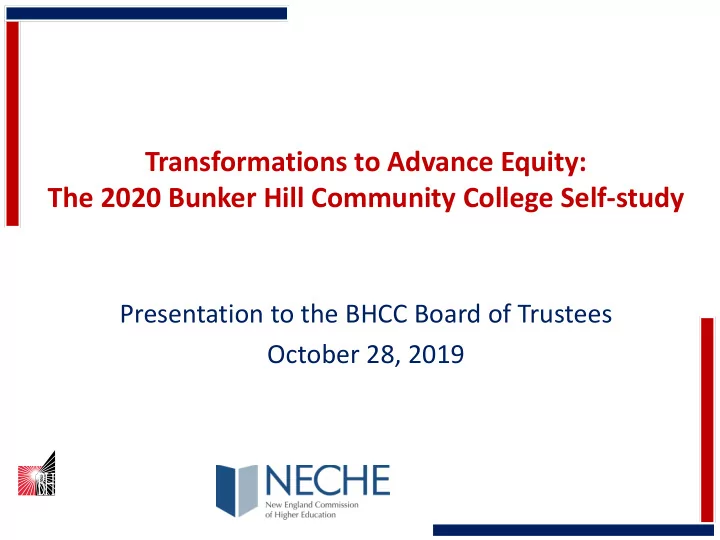

Transformations to Advance Equity: The 2020 Bunker Hill Community College Self-study Presentation to the BHCC Board of Trustees October 28, 2019
BHCC’s 2020 Self-study – An Inclusive & Participative Process Broad engagement from over 200 faculty, staff, administrators, students, alumni & Board of Trustees AY 2016 – 2017: Chief editor (Prof. Puente) appointed, work teams created, & NECHE Data First Forms prepared AY 2017 – 2018: NECHE was the focus: • at Convocation & Collegewide Retreat in fall • at NECHE Think Day & NECHE Retreat Day in spring • of regular meetings of Standard Committees, as committee members engaged in analysis & prepared 1 st rough draft AY 2018 – 2019: Activities focused on writing, critiquing, re-writing
Institutional Overview of BHCC • Founded in 1973, BHCC is the largest of all 15 community colleges in Massachusetts one of the most diverse institutions of higher learning in the state & in the country: 66% students of color: 26% Hispanic/Latino, 25% African American, 11% Asian Average student age: 26 More than half are women More than half are 1 st generation college students Three out of four work either full-time or part-time Three out of five are parents Over 1,200 dual enrollment students Nearly 900 international students come from 90 countries & speak 75 languages
Institutional Overview of BHCC • BHCC is also a Minority Serving Institution (MSI) designated as an Asian American Native American Pacific Islander Serving Institution (AANAPISI) eligible for designation as a Hispanic Serving Institution (HSI) • Offers the most affordable college education across the state (the lowest tuition & fees) • Students can choose from over 100 associate degree & certificate programs • Two campuses (Charlestown & Chelsea), 3 satellite campuses, 3 instructional centers • Finally, BHCC is nationally recognized for being innovative – this has allowed the College to thrive despite decreased, unpredictable state funding & physical space limitations
Highlights of the 2020 Self-study • Broad changes & reforms in the last 5 years have transformed the College • Transformational changes in nearly all the NECHE standards
Mission & Visual Here??? Purposes Integrity, Planning & Transparency Evaluation & Public Disclosure Organization & Educational Governance Effectiveness Institutional The Academic Resources Program Teaching, Students Learning & Scholarship
Highlights of the 2020 Self-study • Updated Mission, Vision & Values (approved in 2014) has enabled the College to expand in critical growth areas (Standard 1) • Practice of strategic thinking is becoming a regular habit across all units – impact of strategic planning cycle & institutionalization of annual unit planning (Standard 2) • Review of governance to increase participatory governance in its final stages (Standard 3) • Institutional Learning Outcomes (ILOs) created, Curricular Reforms implemented, Learning Communities (LCs) scaled further (Standard 4)
Highlights of the 2020 Self-study • Overhaul of Admissions Process & Onboarding process for new students; LCs required for part-time students (Standard 5) • Cultural Institutes consolidated into Center for Equity & Cultural Wealth (CECW), increasing emphasis on professional development (PD) activities grounded in equity principles (Standard 6) • BHCC is financially healthy and stable: $4 million budgeted deficit eliminated; creation of Student Central & DISH, relocation to a larger Chelsea Campus; a more diverse BHCC workforce overall; continuing efforts to improve technological infrastructure (Standard 7)
Highlights of the 2020 Self-study Impact of Transformations on Our Educational Effectiveness (Standard 8) • We remain the most affordable community college • We have increased our accessibility to different student populations (early college, AAPI, Latinx, Pell-eligible)
Highlights of the 2020 Self-study Impact of Transformations on our Educational Effectiveness (Standard 8) • Compared to our peer institutions, our students have demonstrated higher persistence rates (vs. ATD & VFA peer colleges) higher retention rates vs. DHE-state peers (overall, by race, by gender, & by Pell status) & ATD peers a significant increase in successful completion of college- level gateway courses within the first year (32 % for FA ‘16 cohort vs. 13% for FA ‘12 cohort) – the most crucial indicator for us ; successful completion also doubled for all student sub-groups and achievement gaps narrowed for Latinx & African American students
Highlights of the 2020 Self-study Continuing Challenges in the Next Five Years • Compared to our peer institutions, our students have lower 6- year completion rates; 30% (nearly 1/3) transfer w/o a credential – we need to understand better why & how this happens • Enrollment, & overall persistence & retention rates have been decreasing for the last 3 years – ATD Holistic Student Support Redesign Project expected to address these issues • We are at 168% capacity in terms of physical space utilization - - $65 million fund for new building anticipated to help address this issue
Highlights of the 2020 Self-study • System Improvements have also improved our institutional integrity & transparency (Standard 9) • We still need to: conduct a comprehensive campus climate assessment review our Title IX processes create publications that are more accessible to our linguistically diverse student population publish more complete information
Highlights of the 2020 Self-study Continuing Challenges in the Next Five Years • Academic Program Review process needs to be tightened – need to integrate with faculty PD needs & work of Student Learning Outcomes Assessment Program (SLOAP). • Improvements in assessment needed Better, deeper understanding of student patterns through student voices & narratives (engaging in quantitative and more qualitative data analysis) Assessment of Student Support Services (SLOAP team re- configuration is a step in the right direction) Creating the Institutional Assessment Plan (IAP)
Current Progress & Next Steps • Currently in-progress Feedback from students and adjunct faculty in progress this week IMC working on fixing certain web links • Next steps By 11/15: Incorporate community & BOT feedback into final draft; complete all appendices; update all DFFs Final production of self-study c/o IMC Data Warehouse Team & Accreditation Visit Team will accelerate prep activities Send final draft of self-study to Accreditation Visiting Team by mid-February
2020 NECHE Self-study Any Questions? Comments?
Recommend
More recommend